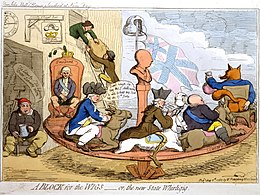Political party
A political party is an organization that coordinates candidates to compete in a particular country's elections. It is common for the members of a party to hold similar ideas about politics, and parties may promote specific ideological or policy goals.
Political parties have become a major part of the politics of almost every country, as modern party organizations developed and spread around the world over the last few centuries. It is extremely rare for a country to have no political parties. Some countries have only one political party while others have several. Parties are important in the politics of autocracies as well as democracies, though usually democracies have more political parties than autocracies. Autocracies often have a single party that governs the country, and some political scientists consider competition between two or more parties to be an essential part of democracy.
Parties can develop from existing divisions in society, like the divisions between lower and upper classes, and they streamline the process of making political decisions by encouraging their members to cooperate. Political parties usually include a party leader, who has primary responsibility for the activities of the party; party executives, who may select the leader and who perform administrative and organizational tasks; and party members, who may volunteer to help the party, donate money to it, and vote for its candidates. There are many different ways in which political parties can be structured and interact with the electorate. The contributions that citizens give to political parties are often regulated by law, and parties will sometimes govern in a way that favours the people who donate time and money to them.
Many political parties are motivated by ideological goals. It is common for democratic elections to feature competitions between liberal, conservative, and socialist parties; other common ideologies of very large political parties include communism, populism, nationalism, and Islamism. Political parties in different countries will often adopt similar colours and symbols to identify themselves with a particular ideology. However, many political parties have no ideological affiliation, and may instead be primarily engaged in patronage, clientelism, or the advancement of a specific political entrepreneur.
Political parties are collective entities that organize competitions for political offices.[1]: 3 The members of a political party contest elections under a shared label. In a narrow definition, a political party can be thought of as just the group of candidates who run for office under a party label.[2]: 3 In a broader definition, political parties are the entire apparatus that supports the election of a group of candidates, including voters and volunteers who identify with a particular political party, the official party organizations that support the election of that party's candidates, and legislators in the government who are affiliated with the party.[3] In many countries, the notion of a political party is defined in law, and governments may specify requirements for an organization to legally qualify as a political party.[4]
According to Anson D. Morse, a political party is a durable organization united by common principles which "has for its immediate end the advancement of the interests and the realization of the ideals... of the particular group or groups which it represents."[5]


.jpg/440px-The_Ideals_of_United_Australia_(cropped).jpg)


